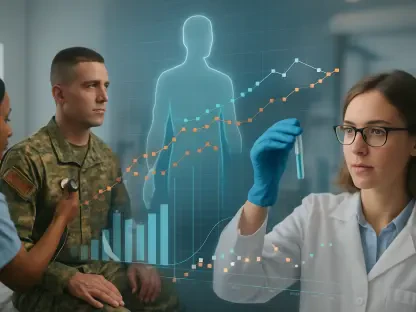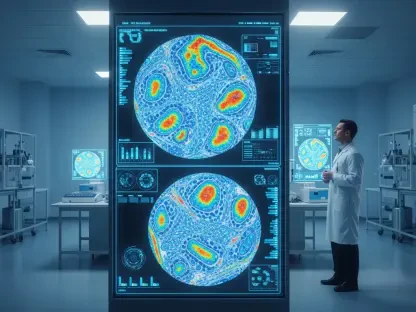Precision Medicine (PM), also known as personalized medicine, tailors medical treatments to individual characteristics, specifically focusing on genetic profiles. The intersection of PM and Artificial Intelligence (AI) is accelerating the adoption and effectiveness of precision medicine, addressing both its promise and the barriers to its mainstream adoption.
The Promise of Precision Medicine
Historically, medical treatments have been disease-centric rather than patient-centric. On average, treatments cater to an “average” patient, often neglecting individual nuances that could be pivotal in preventing or treating diseases. Personalized Medicine aims to overcome this by ensuring that the right treatment is administered to the right individual at the right time, potentially transforming reactive care into proactive and preventive care. This shift holds the promise of significantly improving patient outcomes, as healthcare providers can tailor their interventions based on unique patient data.
A Shift from Disease-Centric to Patient-Centric Care
Personalized Medicine is a transformative approach that changes the traditional model of healthcare. Instead of focusing therapies on generalized standards, it fine-tunes medical care to the specific needs of individuals, driven by their genetic, environmental, and lifestyle factors. This paradigm shift marks a departure from one-size-fits-all treatments and aims to provide precision in determining what a patient precisely needs. For instance, genetic testing can uncover mutations that make certain patients resistant to standard treatments, highlighting the necessity of a patient-centric model.
Case Study: Breast Cancer Patient
A compelling scenario illustrates the potential of PM: a breast cancer patient who did not respond to standard chemotherapy due to a rare genetic mutation. Genetic testing revealed resistance, leading to the development of a targeted therapy successful in battling cancer. This specific case underscores the fundamental concept of PM – customizing treatments to individual patient profiles for more effective outcomes. The success of such tailored treatments not only provides hope to patients with resistant forms of the disease but also emphasizes the crucial role of genetic insights in driving innovative therapeutics.
Barriers to Mainstream Adoption
Data-Intensive Genomic Testing
Despite its promise, Precision Medicine has not yet become mainstream due to substantial barriers. Foremost among these is the dependency on genomic testing, which is enormously data-intensive and has been challenging to conduct at scale. The sheer volume of data involved in processing genetic profiles and correlating them with clinical outcomes necessitates cutting-edge technology for efficient analysis. Advanced computing capabilities are essential for managing and interpreting this data, highlighting the need for investments in technology infrastructure.
The vast amount of data required for PM necessitates advanced technological solutions to manage and analyze it effectively. Additionally, the cost and expertise required to perform comprehensive genetic testing are significant obstacles. To bring PM into the mainstream, healthcare systems must invest in scalable technologies and make genomic testing more affordable and accessible. Affordable genomic testing could democratize PM, enabling widespread implementation across various demographics, ultimately transforming healthcare delivery.
Need for Healthcare System Overhaul
PM requires re-training medical practitioners to adopt a more patient-centric approach rather than focusing solely on diseases. Regulatory and operational overhauls are necessary to update healthcare systems to accommodate the varying drugs, diseases, and treatment combinations intrinsic to PM. This transformation demands significant changes in the current healthcare infrastructure. Transitioning from a disease-centric to a patient-centric model involves revising medical curricula and continuous education programs for healthcare professionals.
Healthcare systems also need to adopt new regulatory frameworks that support personalized treatments. On a systemic level, these changes require coordination between various stakeholders, including policymakers, healthcare providers, and pharmaceutical companies. The complexity of these transformations poses a substantial challenge, but they are vital for successfully integrating PM into everyday practice. Ensuring that all stakeholders work collaboratively is key to realizing the full potential of PM in improving patient outcomes.
AI’s Role in Accelerating Precision Medicine
Analyzing Vast Datasets
AI’s capability to process and analyze massive amounts of patient data (including genetic information, medical histories, and clinical trials) can identify patterns and trends not discernible to humans. These comprehensive datasets become consumable and actionable by medical professionals. Without AI and modern computing devices, this large-scale task would be near impossible, significantly advancing the cause of PM. AI algorithms excel in spotting correlations and making sense of complex data, providing deep insights that drive personalized interventions.
The integration of AI can turn these data-intensive tasks into streamlined processes, facilitating quicker and more accurate diagnostics and treatment planning. For example, an AI system could analyze a patient’s genetic data alongside their medical history to suggest the most effective treatment options. This ability to decipher vast datasets is essential for making Precision Medicine a practical reality, offering healthcare providers a powerful tool for decision-making.
Predicting Disease Risk
AI, particularly through machine learning algorithms, can predict an individual’s disease risk based on personal factors (genetic makeup, lifestyle). This predictive analysis is a game-changer for preventive care, as doctors can devise personalized plans and recommend lifestyle or dietary changes for high-risk individuals. Predictive analytics allows early interventions, shifting the focus from treatment to prevention. By identifying risk factors early, AI can help in designing tailored preventive strategies.
Additionally, integrating data from edge patient monitoring devices (e.g., heart rate monitors, diabetes monitors, CPAP machines) allows real-time updates and adjustments to preventive measures, providing valuable centralized data to doctors. These real-time insights can prompt timely interventions, enhancing patient monitoring and preventive care. The ability to monitor and respond to health changes promptly ensures that patients receive continuous, personalized care that adapts to their evolving needs.
Developing Targeted Treatments
AI in Drug Discovery
AI aids researchers in developing new drugs and therapies that are highly effective and have fewer side effects, focusing on specific patient populations. In drug discovery, AI-designed drugs are increasingly mainstream, significantly improving the success rates of clinical trials by reducing costs and time while ensuring representative trial data. Machine learning models can predict how patients will respond to new compounds, optimizing the drug development process and improving its efficiency.
Innovative AI tools are revolutionizing traditional drug discovery methods, accelerating the identification of promising therapeutic candidates. The application of AI in creating targeted treatments ensures that medications are tailored to specific genetic profiles, enhancing effectiveness and minimizing adverse reactions. This precise approach to drug discovery is crucial for developing treatments that meet the unique needs of individual patients.
Optimizing Treatment Plans
AI assists healthcare providers by selecting personalized treatment options based on unique patient characteristics and up-to-date medical research. This optimization ensures patients receive the most appropriate care tailored to their precise needs, enhancing the overall effectiveness of treatments. By analyzing individual patient data, AI can recommend the best therapeutic pathways, consider potential drug interactions, and suggest adjustments based on real-time health changes.
The ability of AI to integrate vast amounts of data from diverse sources enables it to keep treatment plans current with the latest medical research. This dynamic approach ensures that patients receive cutting-edge care that is continuously refined based on emerging scientific knowledge. The intersection of AI and PM facilitates a level of personalization in treatment that was previously unachievable, maximizing patient health outcomes.
Enhancing Patient Recovery and Monitoring
AI-assisted Recovery
Personalized AI assistants can monitor patient recovery journeys closely, triggering alerts for timely interventions by healthcare personnel, enhancing the recovery process’s supervision. This close monitoring ensures that any complications are addressed promptly, improving patient outcomes. AI systems can track recovery metrics, predict potential setbacks, and provide actionable insights to healthcare providers, ensuring a more thorough evaluation of patient progress.
AI-powered recovery tools can also offer personalized rehabilitation plans, adjusting recommendations based on individual responses. This adaptability ensures that post-treatment care meets the specific needs of each patient, promoting faster and more effective recoveries. By continuously monitoring patients and providing real-time feedback, AI facilitates a proactive approach to recovery management, significantly enhancing patient experiences and outcomes.
Monitoring Patient Progress
AI-powered systems can track a patient’s progress over time, identifying potential complications early and adjusting treatment plans proactively as needed. This continuous monitoring is crucial for maintaining the effectiveness of personalized treatments and ensuring long-term health benefits. AI can detect subtle changes in patient data that may indicate the need for treatment adjustments, enabling timely interventions that prevent complications from escalating.
By leveraging AI for ongoing patient monitoring, healthcare providers can ensure that treatments remain effective and tailored to each patient’s evolving health status. This approach supports the long-term success of Precision Medicine, offering sustainable health benefits through personalized care. Continuous monitoring not only improves patient outcomes but also enhances the overall efficiency of healthcare delivery by reducing the need for reactive measures.
Governance and Privacy Concerns
Data Sharing and Privacy Controls
The deployment of AI in PM involves critical governance and privacy concerns. Regulations must be updated to make data sharable and accessible globally while maintaining privacy controls. Ensuring that patient data is protected while being used for medical advancements is a delicate balance that needs careful management. Robust policies must be in place to safeguard patient information, ensuring compliance with privacy laws and ethical standards.
Global data sharing practices must harmonize to facilitate collaborative research while respecting individual privacy rights. Effective data governance frameworks are essential for building public trust and enabling the ethical use of AI in Precision Medicine. Addressing privacy concerns comprehensively is imperative for the successful integration of AI into mainstream healthcare practices.
Economic Barriers and Subsidization
The high costs associated with genomic testing and compute-intensive resources necessitate initial subsidization to ensure PM transcends economic barriers, making it accessible to a wider population beyond the wealthy. Implementing ethical practices and appropriate data policies is crucial for ensuring the mass success of AI-driven PM. Financial support mechanisms, such as government subsidies or public-private partnerships, can help lower the barriers to entry.
Equitable access to Precision Medicine requires initiatives that address cost disparities and make advanced healthcare technologies available to all socioeconomic groups. Ensuring broad accessibility is vital for realizing the full potential of Precision Medicine and achieving health equity. As the technology matures, continued efforts to reduce costs and enhance affordability will play a pivotal role in its widespread adoption.
Real-World Applications and Future Prospects
Biotechnology Startups and Protein Analysis
Biotechnology startups are already using AI to drastically improve protein analysis and reduce prediction times. These advancements are paving the way for more effective and personalized treatments, showcasing the real-world applications of AI in PM. AI-driven protein analysis can lead to more accurate identification of therapeutic targets, accelerating the development of new treatments.
By leveraging AI, biotechnology firms can streamline research processes, making it possible to explore novel therapeutic approaches more efficiently. These innovative applications demonstrate the transformative impact of AI on the biomedical field, highlighting its potential to revolutionize research and development in personalized medicine. The collaborative efforts of startups and established medical institutions are crucial in pushing the boundaries of what Precision Medicine can achieve.
Transforming Cancer Detection
Precision Medicine (PM), often called personalized medicine, customizes medical treatments based on an individual’s unique characteristics, particularly their genetic makeup. The fusion of PM with Artificial Intelligence (AI) is rapidly enhancing the adoption and efficiency of precision medicine, making it more accessible and effective. AI aids in interpreting vast amounts of genetic data, enabling more accurate and tailored treatments. This synergy addresses various obstacles that have hindered the widespread acceptance of PM, such as data complexity and the need for significant computational power. As AI algorithms improve, they allow for faster, more precise analysis and predictions, which in turn enhances patient outcomes and treatment success rates. Consequently, AI is pivotal in overcoming the challenges and realizing the full potential of precision medicine, promising a new era of healthcare where treatments are specifically designed for individual patients, leading to better, more targeted therapies and overall improvements in health management.









